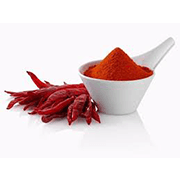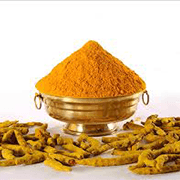-
 Coriander powder is derived from the seeds of the coriander plant. It adds a mild flavour and aroma to sweet and savory food preparations. Coriander powder is useful as a tea, because of its helpful effects on the digestive tract, and is good for increasing appetite, and relieving nausea, diarrhea, flatulence and indigestion.
Coriander powder is derived from the seeds of the coriander plant. It adds a mild flavour and aroma to sweet and savory food preparations. Coriander powder is useful as a tea, because of its helpful effects on the digestive tract, and is good for increasing appetite, and relieving nausea, diarrhea, flatulence and indigestion. -
 Curry powder is a generic term for spice mixes used to flavor Indian or Southeast Asian cuisine. Although there is no standard recipe, the main components are usually cumin, coriander, and turmeric. Other common ingredients include: red or black pepper, mustard, ginger, clove, cardamom, bay leaf, and fenugreek. Commercial blends are often available in mild or hot.
Curry powder is a generic term for spice mixes used to flavor Indian or Southeast Asian cuisine. Although there is no standard recipe, the main components are usually cumin, coriander, and turmeric. Other common ingredients include: red or black pepper, mustard, ginger, clove, cardamom, bay leaf, and fenugreek. Commercial blends are often available in mild or hot. -
 Fennel symbolizes longevity, courage, and strength. Its use as medicinal values, fennel has many health benefiting nutrients, essential compounds, anti-oxidants, dietary fiber, minerals, and vitamins.
Fennel symbolizes longevity, courage, and strength. Its use as medicinal values, fennel has many health benefiting nutrients, essential compounds, anti-oxidants, dietary fiber, minerals, and vitamins. -
 Fenugreek Powder has been used medicinally and for culinary purposes for millennia. It is most often utilized in Indian, Egyptian, and Middle Eastern cuisine, but is used commercially as a flavoring agent in much of the world. Medicinally, it has been utilized in traditional herbalism.
Fenugreek Powder has been used medicinally and for culinary purposes for millennia. It is most often utilized in Indian, Egyptian, and Middle Eastern cuisine, but is used commercially as a flavoring agent in much of the world. Medicinally, it has been utilized in traditional herbalism. -
 Like the name indicates, dry ginger powder is the grounded form of dried ginger roots. It is essentially used as a seasoning agent. However, the powdered form doesn�t carry the strong pungent flavor from the roots. Hence, it is used for giving a mild taste to the dishes.
Like the name indicates, dry ginger powder is the grounded form of dried ginger roots. It is essentially used as a seasoning agent. However, the powdered form doesn�t carry the strong pungent flavor from the roots. Hence, it is used for giving a mild taste to the dishes. -
 Dried Chilli flakes (crushed red pepper flakes) are most commonly recognized as a condiment to be sprinkled onto pizzas. However, they are also used for many other applications such as stir-fries, pastas, salads, and infusing cooking oils. Their heat can vary depending on the variety of Chilli used.
Dried Chilli flakes (crushed red pepper flakes) are most commonly recognized as a condiment to be sprinkled onto pizzas. However, they are also used for many other applications such as stir-fries, pastas, salads, and infusing cooking oils. Their heat can vary depending on the variety of Chilli used. -
 Chilli Powder is one of the important part of Indian cuisine &is used as a spice to add pungency or piquancy and flavor to dishes. Chilies carry a good amount of minerals like potassium, manganese, iron, and magnesium.
Chilli Powder is one of the important part of Indian cuisine &is used as a spice to add pungency or piquancy and flavor to dishes. Chilies carry a good amount of minerals like potassium, manganese, iron, and magnesium. -
 Cumin powder has been used as a poultice and suppository. Traditional uses of cumin powder include to reduce inflammation, increase urination, prevent gas, and suppress muscle spasms. It has also been used as an aid for indigestion, jaundice, diarrhea, and flatulence
Cumin powder has been used as a poultice and suppository. Traditional uses of cumin powder include to reduce inflammation, increase urination, prevent gas, and suppress muscle spasms. It has also been used as an aid for indigestion, jaundice, diarrhea, and flatulence -
 Turmeric has long been used as a powerful anti-inflammatory in both the Chinese and Indian systems of medicine. Turmeric was traditionally called "Indian saffron" because of its deep yellow-orange color and has been used throughout history as a condiment, healing remedy and textile dye.
Turmeric has long been used as a powerful anti-inflammatory in both the Chinese and Indian systems of medicine. Turmeric was traditionally called "Indian saffron" because of its deep yellow-orange color and has been used throughout history as a condiment, healing remedy and textile dye.
